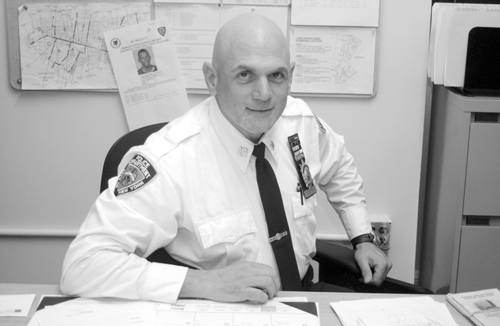By Albert Amateau
In his 23 years with the N.Y.P.D., Captain Anthony Bologna, the new commanding officer of Lower Manhattan’s First Precinct, has been all over Manhattan and much of Brooklyn.
He’s been a SNEU (Street Narcotics Enforcement Unit) cop busting drug pushers, served in Manhattan South in an anti-drunk-driving squad, worked in the Brooklyn South Task Force in the early 1990s during the Crown Heights riot, investigated police officers involved with drug dealers in the Internal Affairs Unit, served in the Organized Crime Control Bureau, led a detective squad in Washington Heights that closed a dozen murder cases one year, and served as commanding officer of the Manhattan South Task Force just before assuming command of the First Precinct at the end of last month.
“One thing about police work in this city, it’s all about change,” he told a visitor last week. “With me there’s really been a lot of change and I love it—most of my changes have come because of promotions,” he said.
A native and resident of Staten Island with his family (wife, two grown daughters and a son, 13), Bologna also serves in the U.S. Coast Guard Reserve with a rank of chief petty officer as a “sea marshal” inspecting ships that come into New York Harbor. He earned a B.S. from John Jay College in 1990 and in June of 1998 completed the program for law enforcement professionals at the FBI National Academy.
Bologna, 51, became a policeman relatively late in life.
“I was 27, married and owned a deli in Staten Island,” he recalled. He started at C.C.N.Y. as a 20-year-old hoping to become a teacher, but in the mid 1970s, the city was in the midst of a fiscal crisis and was laying off teachers. Bologna had worked part time in a Port Richmond, S.I., deli and decided to stay with it, eventually buying out the owner.
“But I always wanted to be a police officer,” he said. Cops who came into the deli would encourage him to take the test, which he did in 1982, a year that the city was recovering economically. The Police Academy took 3,000 cadets that year.
Bologna’s first assignment was in the Seventh Precinct on Pitt St. on the Lower East Side. Manhattan South Borough Command at the time was in the same building, and Bologna and a partner were assigned by the command to make D.W.I. arrests of drunk drivers. The offenses were frequent and often blatant. “Drivers would stop and ask us directions with cans of beer in their hands,” he recalled.
Bologna next went to SNEU units in the Seventh and then the Ninth Precincts, both on Downtown’s East Side. “We’d climb up fire escapes to the roofs with binoculars for observation. It put me in the middle of the narcotics enforcement street scene,” he said. In January, 1988, he transferred to the Organized Crime Control Bureau, working again on narcotics enforcement, “at a more interesting level,” he said.
He moved to the 76th Precinct in Brooklyn in 1989 as a sergeant and then went to Brooklyn’s 72nd Precinct. His career then took him to the Brooklyn South Task Force where he was on duty during the boycott of Korean grocery stores by black activists in 1990 and the Crown Heights riots in 1992.
“It was a rough period. Buildings burned, rocks were being thrown. I got the feeling that nothing would ever be the same again. But it took a while to see that it wasn’t nearly as bad as it looked,” he said.
In Feb. 1993 he began working as an internal investigator in the Chief of Patrol’s office. “It was my first taste of internal investigation and it opened my eyes to the darker side of police work,” Bologna said. “You read in the papers about cops doing things that you can’t believe because you think everybody’s like you. But a department this large can’t really be completely free of it. If you don’t find anything wrong, you’re in real trouble because you’re not looking.”
“I don’t think I could work in the pre-Knapp [before the Knapp Commission investigations] days in the early ‘70s,” he said. In the past, service in Internal Affairs was held in low esteem. “But it is now a career path,” Bologna observed. When officers go before promotion review boards, representatives of all divisions are present, but Internal Affairs has the first option on candidates.
Promoted to lieutenant in 1996, he went back to the Lower East Side’s Seventh Precinct. He became a detective the next year and was appointed head of the squad in the 30th Precinct in Washington Heights, two years after the “Dirty 30” corruption scandal shook up the precinct. There were 18 homicides in 1997, all but four or five of which were solved, and 12 homicides in 1998, which were all solved, Bologna recalled.
But his career path changed again when he passed the exam for captain and won the promotion in October, 1998 that sent him back to Manhattan South Borough Command. He became acting commanding officer in February 2000 of the command’s Task Force, the unit that responds to special situations like demonstrations and received the full appointment in May the following year.
On May 30, 2005, Bologna was name C.O. of the First Precinct.
“Getting the command of a precinct is the real test of a career officer,” said Bologna, “It’s a big responsibility and doesn’t leave me much time to do things like scuba diving, but I love it.”
Albert@DowntownExpress.com
WWW Downtown Express




























